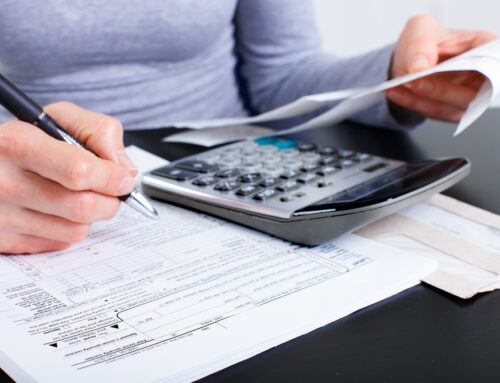Taxes can be stressful, especially as a freelancer, consultant, independent contractor, or sole proprietor. Not only do you have to file for income taxes, but you also have to file for your business.
Where do you start? What can you deduct? What counts as a business expense? TriStar CPAs are here to help you navigate through tax season worry-free.
Self-Employed Tax Basics
Assuming your net earnings as a freelancer or independent contractor were more than $400 for the whole year, you will need to file business taxes as a self-employed individual.
Be sure to register your business activities with the local, state and federal taxing authorities in each location in which you’re conducting business. Some local taxing authorities require your home office to be registered with the city codes department as well. The state you’re doing business in will have guidelines on their website that you can use to ensure you’re registered properly, so your tax payments can be processed without a hitch.
Because you are self-employed, you are considered both the employee and the employer by the IRS. Therefore, you will pay 100% of the self-employment tax, which in 2023 is 15.3%. This tax is in addition to your income tax. The self-employment tax is the same Social Security and Medicare taxes that those who are employed automatically pay 50% of the tax through withholdings from their paychecks. Employers contribute the other 50% of that tax. As a self-employed individual, you will pay both the employee and the employer portions.
With the basics covered, let’s dive into some tips to help you file your taxes.
10 Tax Tips for Freelancers, Contractors, and Consultants
Tip 1: Keep up with your taxes throughout the year.
Don’t wait until the last minute to gather all the paperwork and assess your potential tax liability. Aim for a quarterly tax review to know exactly where you stand financially. Better yet, update your earnings and expenditures weekly, if not daily. The more often you update your financial records, the more accurate your tax remittances will be.
Additionally, keep track of all your 1099-NECs. As a freelancer or consultant, you likely have multiple sources of income because of having multiple clients. You will need every 1099-NEC (and 1099-K if you use PayPal) in addition to complete financial records to file your taxes correctly.
Tip 2: Use tax software.
Using software specifically designed for freelancers to keep track of their expenses, invoices, income, etc., can help you stay organized, especially if you’re not fluent with spreadsheets.
Tip 3: Use resources from the IRS.
Visit irs.gov to learn more about freelance and sole proprietor tax obligations, home office deductions, how to file your annual return, and more.
Tip 4: Know your deductions.
As many people likely know, there are multiple expenses you can use as business deductions as long as those expenses are solely business related. Here are some examples of deductible business expenses:
- Home office space: If you use a room in your house or apartment (or a corner of a room) solely for business, you can depreciate the value of that space and its contents from your tax obligations. You can also deduct the cost to maintain and protect that business space.
- Office space rent, e.g., a coworking space: If you choose to work outside your house and rent a space instead, you can count the rent as a deduction.
- Equipment and materials: Every business requires certain materials and equipment. Typically, an employer will cover these costs. However, a self-employed person can instead count the expenses as a deduction.
- Phone and internet: Phone and internet bills can also count towards deductions. The key is that the phone and internet are used exclusively for business. Otherwise, it cannot count as a business expense.
- Educational costs for certificates related to your current business: Things like classes, seminars, and online courses to further your knowledge about your trade can count as a business expense. However, it has to be directly related to your current business and not for a future career or hobby.
- Travel to see clients: Costs like airfare, lodging, transportation, etc., while on a trip to meet with clients can count as business expenses. Some people even use part of the trip as a vacation to save some money. However, the number of business days has to be more than the number of vacation days to count as a business expense. Furthermore, lodging and transportation during vacation days cannot count as a business expense.
- Business meals with clients: Treating a client to lunch or dinner at a nice restaurant is a common business practice. So, the meal can count as a deductible expense. If your friend or family member is a client, then this can be a gray area.
- Health insurance premiums: As a freelancer, you can deduct health care premiums, such as medical, dental, and long-term care insurance.
- Legal and professional services: If you use a lawyer, financial advisor, business advisor, tax advisor, etc., for business purposes, those fees can count towards your business tax deductions.
- Bank fees: Fees from opening and maintaining a business account with a bank can also count as a business expense.
- Business Insurance: You likely need business insurance, depending on your line of work. The cost of business insurance can count toward your deductions.
Tip 5: Keep your receipts for business expenses.
Certain expenses can count as deductible business expenses, such as marketing, travel, and home office expenses. However, you need the receipts to support your business expense claims. Otherwise, your tax liability may increase.
Tip 6: Separate business expenses from personal expenses.
To simplify business expenses, use a separate bank account, credit card, cell phone, laptop, etc., that is solely for business use. This will help you keep track of what you used for business and what you didn’t. Otherwise, you may overestimate or underestimate your business expenses. Self-employed individuals who commingle business expenses with personal expenses risk having certain business expense deductions disallowed by the IRS.
Tip 7: Set aside 20%-25% of your income for tax purposes.
While your estimated tax payments will vary from quarter to quarter, a general rule of thumb is to save around 25% of your income for tax payments. This may need to be adjusted up to 30% in 2026 when certain tax benefits for self-employed individuals are set to expire. If you live in a high-tax state, like New York or California, you may want to set aside closer to 35%.
Tip 8: Place a percentage of your net earnings into a retirement plan.
As a self-employed individual, you can open a retirement plan such as the Simplified Employee Pension plan (SEP). You can put up to 25% of your net business earnings into retirement. If you contribute to a SEP, you won’t pay income tax on the contributions. However, you will pay taxes when you withdraw. There are a few other retirement plans available to self-employed individuals. This is one of the great benefits of owning your own business!
Tip 9: Stay informed on tax laws.
Tax laws can change, so stay informed about updates and changes that may affect freelancers. However, keeping up with changing laws can be daunting, especially when you own your own business. So, consider consulting with a tax professional to ensure you know all relevant regulations.
Tip 10: See a tax advisor or CPA.
Meeting with a professional may be an expense you’d rather not pay. However, the expertise of a tax professional may save you more money in the end. Plus, we all know the adage “time is money” has merit, and a CPA or tax advisor can certainly save you a substantial amount of time. Find one that can work with your budget, like at TriStar CPAs, so you know you will only pay for what you need.
TriStar CPAs in Nashville are Here to Help
As CPAs, we understand how overwhelming tax preparation can be, especially for sole proprietors and self-employed individuals. We love helping people prepare their tax returns and lower their tax obligations! Reach out to us today to see how we can help you with your self-employed tax return.






Leave A Comment